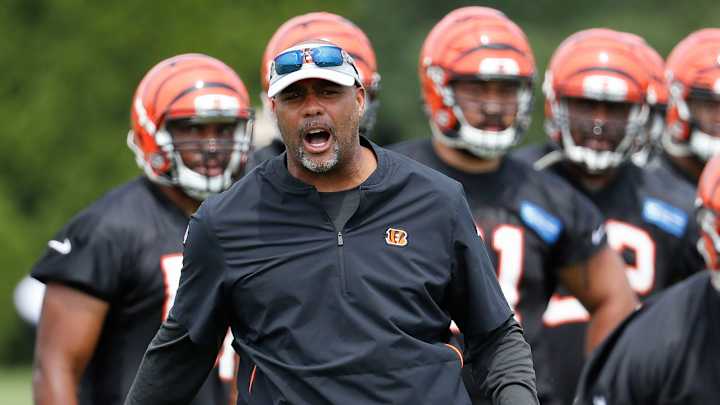So You Fired Your Coordinator. Will It Make a Difference?

Has there been a more perilous time for NFL coaches looking to ascend the employment ladder on the traditional position coach-coordinator-head coach path?
There’s a well-established checklist of steps embattled head coaches must take to extend their time of employment—one being to fire their coordinators to deflect some of the blame—and little that offensive and defensive play-callers can do to avoid the inevitable fallout. The best ones work through the panic. The worst ones get consumed by it. And, for another day, a toxic, paranoid work environment churns on.
On Monday morning, Marvin Lewis, a head coach hired for his defensive acumen, fired his defensive coordinator, Teryl Austin, after the team was pummeled by the New Orleans Saints, 51-14. Last year Lewis fired his offensive coordinator, Ken Zampese, a few weeks into the season.
On Sunday, Buccaneers head coach Dirk Koetter told reporters that he had taken play-calling duties away from offensive coordinator Todd Monken, which is almost as bad. Koetter fired defensive coordinator Mike Smith in October.
DYSFUNCTION IN CLEVELAND: Hue Jackson’s paranoia and Baker Mayfield’s resilience
Earlier this month, Matt Patricia fired special teams coordinator Joe Marciano. The Cardinals fired offensive coordinator Mike McCoy in October, and the Browns fired both head coach Hue Jackson and offensive coordinator Todd Haley. The two were seemingly trying to outlast each other but then banged into one another like spinning tops, clearing themselves off the deck altogether.
We can look statistically at whether these in-season coordinator moves make a difference. The Buccaneers, for example, went from 34.6 points per game under Smith to 28.8 under Mark Duffner. The Cardinals averaged 13.14 points under McCoy and 16 under Byron Leftwich. But anecdotally, is the marginal improvement—or the prospect of marginal improvement—worth the seismic effect such a change can have on the emotional inner workings of a building?
“With the pressure on these head coaches, it’s a way to turn down the heat and make it appear that you’re doing something,” one veteran retired NFL coach and coordinator told me. “It’s somewhat of a cover-your-tail move. Sometimes I understand the temptation. Maybe just a change of the way the plays come in. A new voice. The way the game is called. There are certainly all those possibilities. But far more often than not, it’s going to get worse.”
TODD BOWLES: After loss to the Bills, Jonathan Jones says it’s time for the Jets to make a move
As the coach explained, it gets worse on several levels, which requires a herculean effort on the head coach and the executive team to reverse.
• Coaches are wondering (or fearing) what or who is next. A standard assistant’s deal is for two years, which make it easy for teams to get out of such contracts. Often there are families involved—and housing and school issues, among other personal disruptions—when an assistant is let go. It’s difficult enough to win a football game under normal circumstances, but now tension splits the focus between the task at hand and the people a coach is responsible for.
• Everyone has more work to do. “It definitely hits the position coaches. There’s an increased workload, no question about it. Who is drawing up the practice plans now? You all had your assignments and the lead voice has been removed.” The administrative tasks in a functional NFL environment are already daunting. Imagine writing up daily 7-on-7 play scripts for the scout team offense or defense, in addition to focusing on the game script. A heap of paperwork all of a sudden gets shoved down the ladder with fewer people to help mop it up. “That’s another hour of work that needs to be handled by someone else,” he said.
• Younger staffers get a taste of the coaching’s ugly politics. At many rungs on the ladder, coaches succeed through a unified, egalitarian push. Once the jobs become more desirable, scarce and higher-paid, there is more wheeling and dealing, and covering your backside. If a coordinator gets let go, it can lay bare some of the grim aspects of the coaching world—which, while not much different from any corporate office in America, could still be jarring for a fresh set of newcomers with a previously sunny disposition.
HEAD-COACHES-TO-BE: Seven coordinators to watch in 2018
This is not to say that coaches don’t strike gold from time to time on these fishing expeditions. By all accounts, the Cardinals have improved significantly under Leftwich, who is better utilizing running back David Johnson. Jim Bob Cooter emerged as a momentary spark plug after the dismissal of former Lions offensive coordinator Joe Lombardi. The Ravens fired Cam Cameron back in 2012 and went on to win the Super Bowl.
The trick is being sure about the move, and not just doing it to say you did.
Question or comment? Email us at talkback@themmqb.com.
